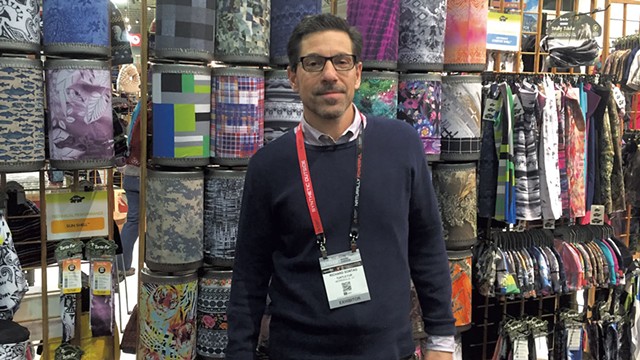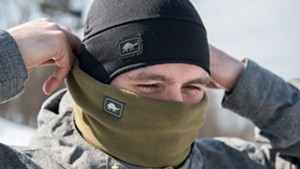
- Courtesy Of Turtle Fur
- Richard Sontag
Some Vermont creations are so iconic that they forever changed how we experience winter: the first photographs of individual snow crystals, by Wilson "Snowflake" Bentley; the first ski tow in the United States, installed in Woodstock; the modern snowboard, made wildly popular by Jake Burton Carpenter.
Add to that list the fleece neck warmer, conceived by Millie Merrill, who knitted the first ones in the basement of the Yellow Turtle, the children's apparel store she owned in Stowe. Merrill's neck gaiter led her to found Turtle Fur, maker of winter headwear and other outdoor accessories, in 1982.
Nearly four decades later, the Morrisville-based company sells 1,200 different products nationwide. Turtle Fur now commands more than half of the specialty retail market for neck gaiters and face tubes, and Merrill's original Turtle's Neck remains one of its best sellers.
Today, Turtle Fur is led by "chief turtle" Richard Sontag, a Long Island native and entrepreneur who bought the company from Millie and John Merrill when the couple retired in 2000. Ordinarily, Sontag doesn't give press interviews — which may seem odd, given that his sister, Deborah Sontag, was a longtime reporter with the New York Times.
But, as Richard Sontag explained in an interview last week, the reasons for his media shyness were twofold. Because he lives in Westchester County, N.Y. — until the pandemic hit, Sontag commuted to Morrisville every other week for two decades — he preferred to let his local staff speak on behalf of the venerable Vermont brand.
Another, more personal reason: It was too painful for Sontag to discuss his son, Jacob. Sontag and his family never moved to Vermont because Jacob suffered from a rare and debilitating genetic disorder called Canavan disease. Because the boy was bedridden and required round-the-clock medical care, moving him to Vermont was impractical. Jacob died five years ago.
In a sense, though, Jacob's illness helped inspire Sontag to chart a new course for the company. In recent years, Turtle Fur has embraced a much stronger social mission, one that includes a planned transition to becoming a certified B corporation — that is, a company committed to meeting specific social and environmental sustainability standards. Sontag believes that such a move is not only good for growing its customer base and weathering the pandemic, but also for helping Turtle Fur become a better corporate citizen.
Back in 2008, Turtle Fur started a program called Project Warmth, which donates cold-weather gear to people in need. It began, Sontag explained, with all the time he was spending in hospitals surrounded by other parents whose children were also critically ill but who lacked the financial resources he had.
"I felt so guilty," Sontag recalled, "I started giving product away."
Soon, he was donating Turtle Fur goods to food kitchens, homeless shelters and schools in low-income neighborhoods. The circle of giving expanded from Vermont to greater New England, then to a nationwide campaign. Since its inception, Project Warmth has donated more than 125,000 products — including 27,000 last year alone — to more than 350 organizations in 43 states.
When the pandemic hit, charitable giving didn't seem like it was in the cards. Like many manufacturers of consumer items, Turtle Fur took hits on multiple fronts. Although the company sells some products direct to consumers through its website, most are sold through small, independent outdoor gear retailers, not big-box or department stores.
Last March, ski resorts across the country closed, just as their season was winding down. Normally, that's when ski shops sell off their remaining inventory and place orders for the following year. With no one placing new orders due to huge uncertainties about the next winter season, Turtle Fur was essentially flying blind.
The company's supply chain also took a hit. Back in the 1980s, Sontag said, Turtle Fur employed more than 200 home knitters in Vermont who stitched its ski hats by hand. In 2007, Turtle Fur moved its manufacturing to Mexico and Asia; the Morrisville-based staff handles sales, marketing, distribution and product design. When COVID-19 emerged, those overseas plants either reduced their hours or closed entirely. Even after they reopened, raw materials were difficult to come by.
But several things worked to Turtle Fur's advantage, Sontag noted. Because the company contracts with small, family-owned manufacturers mostly in Mexico, its production didn't get caught in the bottleneck of large manufacturing facilities, which often produce goods for multiple companies.
The pandemic also presented Turtle Fur with an unexpected new market. Gaiters originally designed to protect people's faces from the cold were also useful in protecting them — and others — from a deadly virus. As demand for face coverings surged, products that Turtle Fur had produced in April and May for shipment in September began shipping instead in June and July, requiring the company to ramp up production. The company also began selling conventional face masks.
By year's end, Sontag noted, Turtle Fur had delivered 95 percent of its products to its dealers on time. The company's 2020 sales figures, which Sontag declined to reveal, exceeded those of the previous year.
Turtle Fur hasn't escaped the pandemic unscathed. Even after securing a federal Paycheck Protection Program loan last spring — he also declined to reveal the amount — Turtle Fur still had to lay off 19 people, reducing its Vermont workforce to 25. Many of those employees had been with the company since Sontag bought it two decades ago.
"When we had the layoffs, I was sick to my stomach for days," Sontag said, who also noted that those who remained, including management, had their hours and pay reduced. Most of the remaining employees have been working remotely for months.
As sales rebounded in the second half of 2020, some staff were rehired on a temporary or part-time basis, and Sontag hopes to bring them all back once the pandemic subsides. And, with demand for outdoor gear and apparel remaining high, Sontag said he is feeling "genuinely optimistic" about 2021.
The global crisis sparked other adaptations, some of which Sontag believes will be permanent. Prior to the pandemic, Turtle Fur would spend $100,000 to attend a single national trade show. When COVID-19 made such events impossible, he said, the company switched to video conferences with its dealers, during which members of each department gave presentations on product designs, branding, philanthropy, sustainability and so on.
For Sontag, who was on the road 32 to 34 weeks a year before the pandemic, this adaptation was a welcome improvement, and he doesn't foresee returning to the days when he would meet with dealers in person himself.
As he put it, "How am I going to go back to one-on-one meetings, where I don't have all these unbelievable people around me doing all that good work?"
Related The Register: A Vermont Guide to Shopping Locally Online












Comments
Comments are closed.
From 2014-2020, Seven Days allowed readers to comment on all stories posted on our website. While we've appreciated the suggestions and insights, right now Seven Days is prioritizing our core mission — producing high-quality, responsible local journalism — over moderating online debates between readers.
To criticize, correct or praise our reporting, please send us a letter to the editor or send us a tip. We’ll check it out and report the results.
Online comments may return when we have better tech tools for managing them. Thanks for reading.